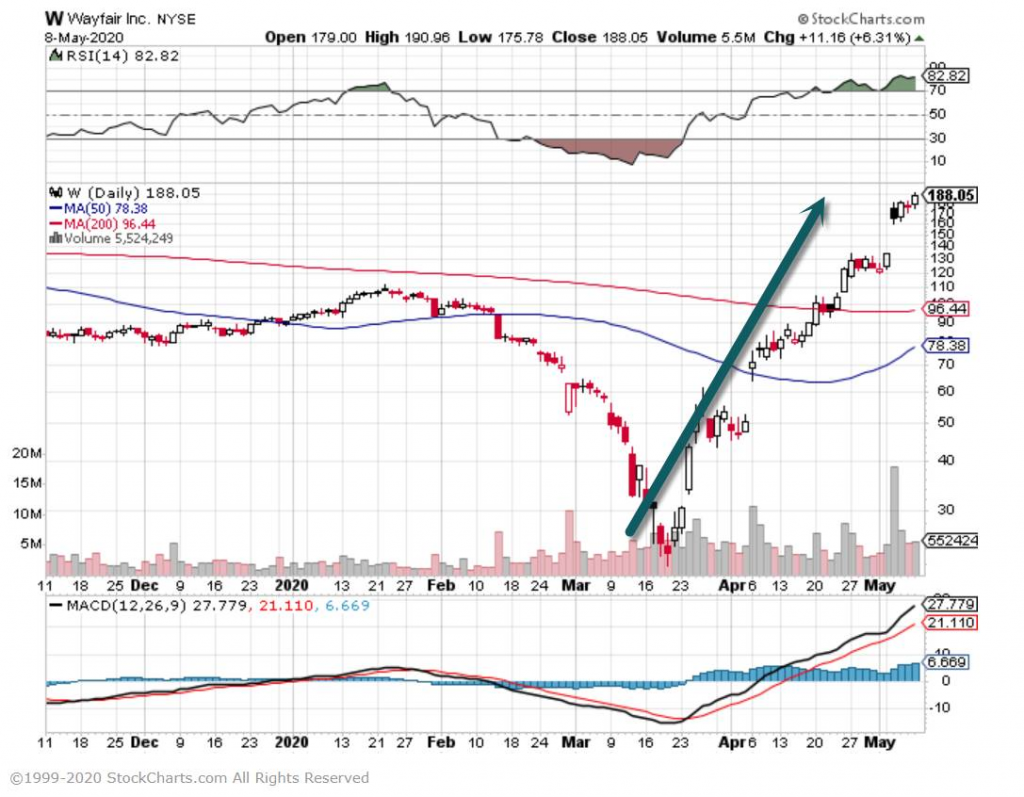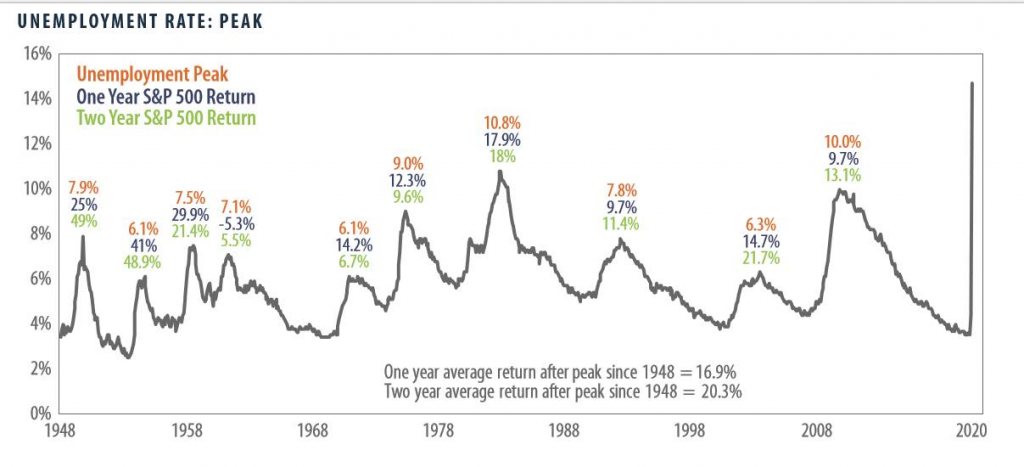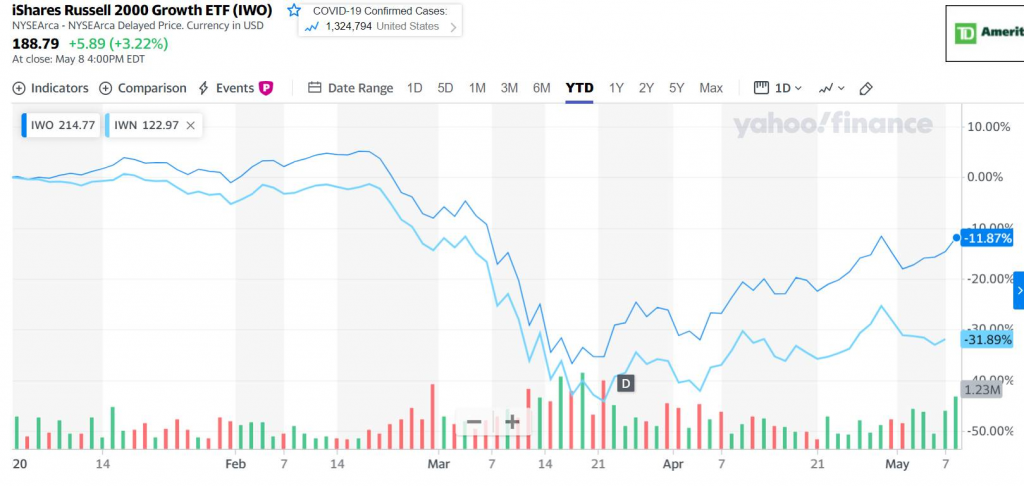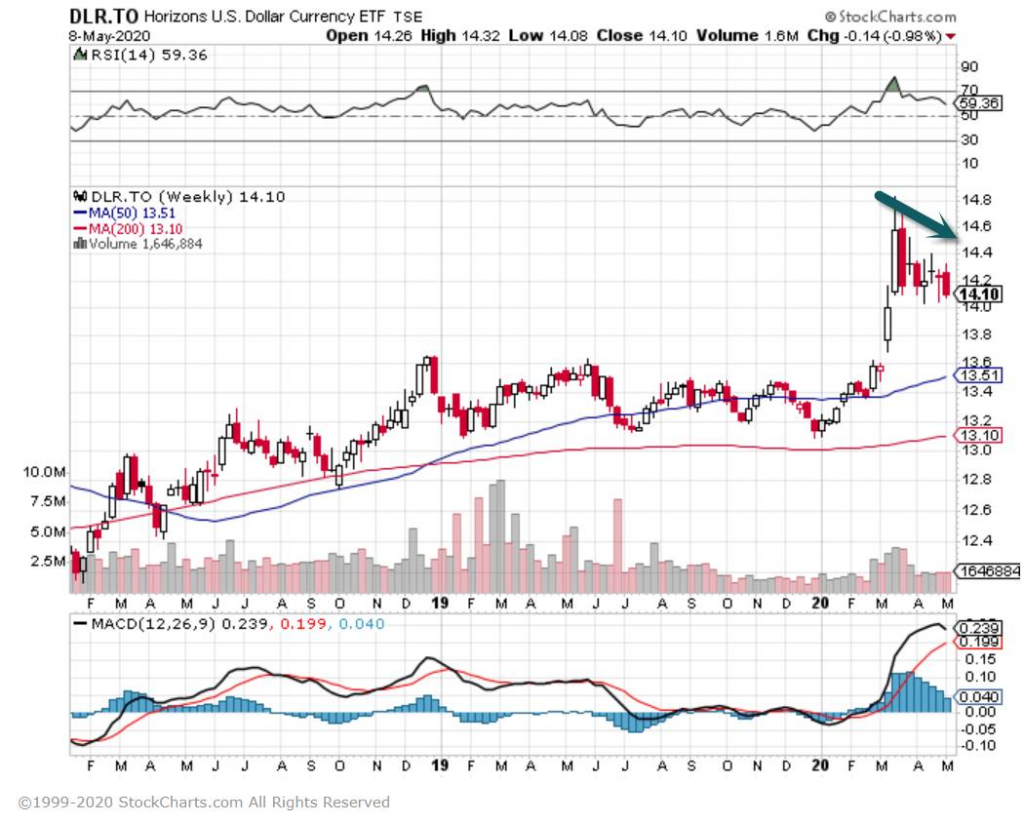1.Treasury Issuance Will Shatter Records in 2020
Guggenheim
2.Most Amazing Chart of Corona Crisis….W-Wayfair Bottomed at $22…Closed Friday $188
3.Unemployment Peak and S&P Returns…
First Trust Economic Blog.
April Employment Report – Data Watch
First Trust Economics Blog
4.Sector Returns Since Corona Crisis
5.U.S. Small Cap Indices Still Down – 20%+ YTD.
Source blackrock
YTD Small Cap Value IWN down almost 3x Small Cap Growth IWO
6.Money Market Funds Up $1.2 trillion in the Last 14 Weeks…B of A Poll 9 Out of 10 Clients Think Current Rally is “Bear Market Rally.”
Dave Lutz Jones TradingFLOW SHOW– BofA says the “cash mountain is yet to peak” with money market fund assets rising $1.2t in the last 14 weeks to $4.8t – Investors pulled $16.2 billion from stocks in the past week in the largest weekly redemption since the March stock market slump, according to the Bank of America’s weekly flows data.
Technology stocks saw the first week of outflows so far this year, with investors redeeming $43 million worth – Gold and high-yield bond funds both saw their biggest six-week inflows on record, with $32 billion flowing into high-yielding bonds in what analysts called a “high-yield comeback”.
Investors added $11.3 billion into bonds and $53.5 billion into cash in the past week, BofA said, with an internal indicator of sentiment at “extreme bearish”. BofA also said that nine of ten clients believed the current market recover was a “bear market rally” and seven out of ten said they would only buy the assets that the U.S. Federal Reserve purchases through it various stimulus schemes.
7.U.S. Dollar Off Its Highs…At Record Valuation Vs. Other Currencies.
Dollar Vs. International Currencies Purchasing Power Parity
8.State of Crude Market
WSJ-Good Read Summary of Oil Market
By Amrith Ramkumar, Tristan Wyatt and Collin Eaton

https://www.wsj.com/articles/the-glut-drowning-the-oil-market-11588843801?mod=itp_wsj&ru=yahoo
9.Chronic Disease Levels By Sex.
Exhibit 2: Percentage distribution of 10 leading causes of death by sex, US 2017
Source: cdc.gov
Found at www.advisorsperspectives.com
10.Are You a Procrastinator, or Just Efficient?
Is It last-minute-itis, or just-in-time thinking?
This post was inspired by two events: I had a colleague who always waited until the last minute to complete tasks. I, on the other hand, always try to get things in early. Waiting until the last minute causes me lots of stress. When I confronted my colleague about her last-minute-itis, she said, “It’s the just-in-time approach: Why expend energy until you really need to?”
The second, constantly-recurring event, is the fact that when I assign papers to students, I always specify a time. I used to require papers due at midnight. Time after time, I would get the bulk of these papers between 11:55-11:59 pm, and some would be late—a few minutes after midnight. (I don’t penalize, but perhaps I should?) I now make papers due at 10 pm—I want them to get some sleep!
Is this phenomenon a negative response—procrastination—or is it, as my colleague suggested, merely just-in-time efficiency?
First, let’s look at what might be good about procrastination. There is some evidence that when it comes to decision making, delaying choosing a course of action until the last minute might lead to better decisions.
Second, it has been argued that in our busy lives, procrastination enables us to put some tasks aside in order to prioritize the things we need to get done.
Finally, there is some evidence that in the short term, procrastination can reduce stress. Imagine that you have an important report to complete for your boss. It causes you some worry because of its importance, but setting it aside for a while, and taking a break to enjoy yourself, helps alleviate that initial stress.
When Is Procrastination Bad?
Clearly, chronic procrastination can cause all sorts of problems. Routinely filing your taxes late, neglecting to go to your annual physical, and taking too long to apply for a job can all lead to disappointing and punishing outcomes.
Psychologists Tice and Baumeister looked at students’ academic procrastination and found that procrastinators experienced more stress, stress-related illnesses, and had lower GPAs than non-procrastinating students.
What Causes Procrastination?
Two processes may account for why people tend to procrastinate—poor time management and poor emotion regulation. Individuals who have trouble scheduling and completing tasks may find themselves chronically late getting things done. Alternatively, if one views a task as undesirable (a negative emotion), that person may get distracted by more positive, desirable experiences and spend time on those.
Perhaps there are different forms of procrastination. While some people may deliberately procrastinate, others may do it unintentionally. A team of researchers has explored unintentional procrastination. Here are some items that suggest that you are prone to this type.
Unintentional Procrastination Scale
article continues after advertisement
How much do you agree with the following items (1 = Do not Agree to 5 = Agree Very Much):
· I rarely begin tasks as soon as I am given them, even if I intend to.
· I intend to get things done, but sometimes this just does not happen.
· I really want to get things finished in time, but I rarely do.
But, what about my colleague who argues for just-in-time thinking? Items that suggest that it’s not procrastination, but just-in-time efficiency would lead an individual to agree with items such as these:
· There’s no use doing something early, when there is plenty of time to do it.
· You don’t gain anything by turning an assignment in early.
· I get energized when a deadline is approaching.
A milder form of procrastination—one that is likely behind my students’ tendency to turn in their papers at the last minute—is represented in C.H. Lay’s procrastination scale. You can take this scale here.
What to Do About It?
If you are a procrastinator, what can you do? Taking a course in time management could help. Second, break large, daunting tasks down into smaller, easier pieces and reward yourself for completing each piece. Give yourself reminders. Use a calendar program to remind yourself to get tasks done. You can also get a “motivational buddy” who can help motivate you to finish tasks.











